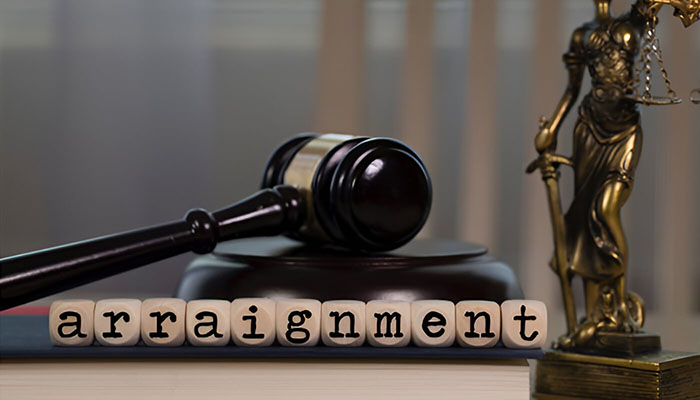Criminal cases can get complicated and involve various proceedings. An important court appearance is the arraignment. During the arraignment, the accused is advised of their legal rights as part of the formal court process. An arraignment does not always result in jail time. Many defendants are released on bond or their recognizance, depending on the seriousness of the crime and other legal issues. Can you go to jail at an arraignment? It is very rare for a defendant to be taken into custody during an arraignment unless a warrant has been issued for a bond violation or other serious offense. Keep reading to learn more about arraignment.
What is an Arraignment?
What does being arraigned mean? An arraignment is the court process that occurs when a person is arrested. Here, the judge officially informs of the reason for the arrest. A judge reads the charges, and the defendant has the opportunity to plead guilty or not guilty.
The judge also decides whether the person can be released until their next court date or if they must remain in jail. The court may establish bail. It is the amount of money that a person can pay to be released from jail until the trial. The arraignment is the first court proceeding to determine the next steps.
What Happens During An Arraignment?
The judge will,
- Call the case.
- Confirm the defendant’s identification.
- Read the charges brought by the prosecutor.
- Ask the defendant to enter an appeal.
- Determine the conditions for pretrial release.
Can You Go to Jail At an Arraignment?
Yes, you can go to jail at an arraignment. The court reads the charges and requests for an appeal during the arraignment. The judge may now additionally determine the terms of bail or release. The defendant may be released on their own recognizance if the charges are minor and they have no prior criminal record.
The court may decide to set bail or refuse it completely if the case is severe. You may be kept in custody if something happens during the case that causes the Judge to reconsider the effectiveness of the bond conditions. The defendant is promptly released pending the next scheduled court hearing.
An arraignment does not always imply incarceration, even though it may lead to someone being committed to jail. The charges and the judge’s judgment will influence the verdict. Having legal counsel is crucial at this point to support the case for fair bail conditions.
Deciding Whether to Enter a Guilty, No Contest, Or Not Guilty Plea
It is essential to understand the result of each appeal choice when making one at arraignment. Making a better choice is crucial because each one could have consequences.
1. Plea of Guilt
The court will likely forgive you immediately if you plead guilty. You should understand that entering a guilty plea can have major repercussions. It includes probation and a jail or prison term. Admitting guilt can have a major impact on your future career and other prospects.
2. Plea Not Guilty
Your case will go to trial if you enter a not guilty plea. Making sure you have enough legal counsel and representation is crucial because this can be an extended process. The charge will try to prove your guilt by presenting evidence during a trial.
3. No Contest Plea
A no contest plea is similar to a guilty plea in that it admits guilt but does not carry any potential criminal punishment. This type of plea may still result in civil consequences like fines or court-ordered process.
Does An Arraignment Imply That You Will Be Sent to Jail Automatically?
Can you go to jail at an arraignment? This is your first court process. Being arraigned does not guarantee you will go to jail. The objective of the arraignment is an official process. It ensures that you are informed of the charges and have the opportunity to respond. Many people are discharged following an arraignment for nonviolent or first-time offenses.
In fact, in some situations, persons are released on their recognizance. It means they agree to return to court for their next hearing without having to post bond. This is more likely if.
- These charges are modest.
- You have a clean record.
- You appeared voluntarily or cooperated during the arrest.
Can You Go to Jail At An Arraignment- Top Alternatives to Jail Time
Depending on the charge and plea entered at your arraignment hearing, you may receive a jail term or an alternative punishment. Here are some alternative sentences you might use:
1. Probation
Probation is a type of court supervision that includes meeting with a probation officer and fulfilling certain conditions such as retaining employment, attending counseling, or performing community service.
2. House Arrest
House arrest imposes restrictions on your movements and activities. You may be obliged to stay at home, wear an electronic monitoring device, or submit regular reports to a probation officer.
3. Diversion Programs
Diversion programs entail completing a program like substance abuse treatment or education classes, rather than doing jail time. A specialized program at a Beverly Hills rehab can be a part of such a diversion program, offering a path to recovery instead of incarceration.
4. Restitution
Restitution entails repaying victims of a crime in order to compensate for losses or damages. If you are convicted of stealing, you may be required to repay the value of the stolen products or return any property that was taken.
Can you go to Jail at a Formal Arraignment?
You should have a clear idea on can you go to jail at an arraignment. Yes. You may face the possibility of going to jail at the formal arraignment. At the formal arraignment:
- The defendant is officially informed of the charges that have been filed.
- The judge may consider previous bail decisions.
- If the charges have risen, bail terms may be changed.
Summing It Up
Now you may have a better knowledge on can you go to jail at an arraignment. You will not always go to jail at an arraignment. It depends entirely on the situation. Having better knowledge about arraignment helps you feel more relaxed. You can consult with a lawyer and prepare thoroughly to increase your chances of avoiding custody. They may help you make better decisions in your hard times.




